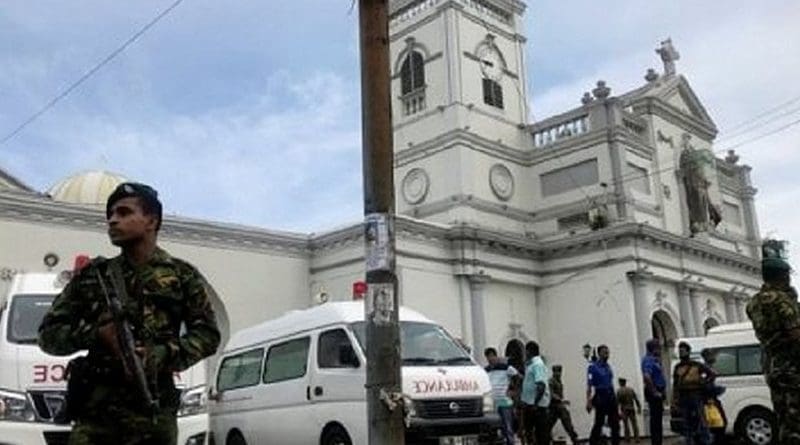Sri Lanka Bombings Are A Dark Augury – OpEd
By Observer Research Foundation
The events in Sri Lanka on Sunday have shocked many around the world. An Easter day attack on three churches and an equal number of hotels, in such coordinated fashion, sounds surreal, even bizarre. Latest reports say 290 people are dead and over 500 injured. It suggests the attacks were planned in meticulous fashion to inflict maximum damage. While no organization has stepped forward to take responsibility, there is speculation that this might be the handiwork of either Tamil fringe-groups or the Islamic State (Daesh)*
By Abhijit Singh
For many regional watchers, Sunday’s attacks are reminiscent of the 26/11 strikes in Mumbai (2008). That year, there were 12 coordinated bombings and shooting attacks across Mumbai, including at a café, the Taj Mahal Palace Hotel, the Oberoi Trident Hotel, and at a Jewish site, the local Chabad house. The attack was coordinated by Lashkar-e-Taiba in Pakistan but unlike the bombings in Sri Lanka, it was carried out by gunmen.
Reports suggest that the attackers in Sri Lanka struck three churches: St. Sebastian’s Church in Negombo, St. Anthony’s Shrine in Colombo and Batticaloa’s Zion Church. As per initial estimates, there have been over 45 deaths in Colombo, 25 in Batticaloa, and 67 in Negombo. In Colombo, three major hotels – the Cinnamon Grand, Shangri-La and Kingsbury – have been stricken, all of them in a line along a major road that links several important central city districts.
Incidentally, it has come to light that earlier this month Colombo’s police chief had warned about a threat of attacks on churches and the Indian High Commission office, close to the hotels bombed in Colombo. Yet it seems Sri Lankan authorities weren’t really convinced about their own advisory; for despite the police chief’s warning of a threat from a local Islamic group, security on the ground before Easter hadn’t really been beefed up.
Of course, the question uppermost on everyone’s mind is: “Who organized these attacks”? While no organization has stepped forward to take responsibility, there is speculation that this might be the handiwork of either Tamil fringe-groups or the Islamic State (Daesh). The latter, experts aver, is the more likely perpetrator, not least since it is the only group presently with the capability, expertise and motivation to carry out complex missions such as a coordinated, high intensity strike on multiple targets. Certainly, the pattern of the attacks – the fact that high-value sites were chosen meticulously to be hit by suicide bombers, and a seeming attempt to create a religious rift by targeting Christian places of worship in a Buddhist-majority country – also hints at the involvement of the IS. Still, it is too early to speculate and only a detailed investigation will reveal the real culprits behind the attack.
The incident is also likely impact on regional security. For some time now, there has been concern in New Delhi about radical Islamic groups spreading their base in South Asia. Indian intelligence agencies say the influence of the so-called Islamic State in India’s neighborhood isn’t significant, but countries like Bangladesh, Pakistan and Afghanistan have all had the shadow of ISIS’ global footprint land on their lands. The attacks in Sri Lanka are bound to raise fears in India of an expanding terror foot print in South Asia – a region vulnerable, and less than ready to combat the challenge.
This commentary originally appeared in Valdai Discussion Club.

